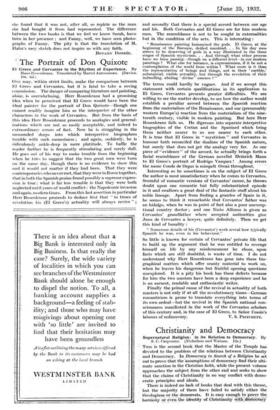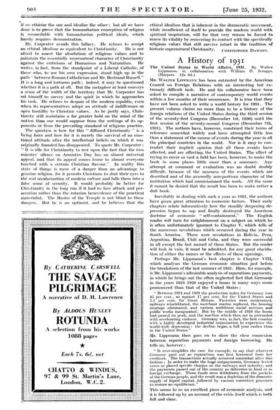Christianity and Democracy
Supernatural Religion: in its Relation to Democracy. By S. C. Carpenter. (Nicholson and Watson. 15s.) Tins is the second book that the Master, of the Temple has devoted to the problem of the relations between Christianity and Democracy. In Dc!nocracy in Search of a Religion he set out to prove that the assumptions of democracy. find Dien- ulti- mate sanction in the Christian faith, while the present volume approaches the subject from the other end and seeks to show that the claims of Christianity in no way conflict with demo- cratic principles and ideals.
There is indeed no lack of books that deal with this theme, but the majority of them have failed to satisfy either the theologians or the democrats. It is easy enough to prove the harmony or even the identity of Christianity yv;.#*Akincida:py
if we ethicize the one and idealize the other ; but all we have done is to prove that the humanitarian conception of religion is reconcilable with humanitarian political ideals, which hardly requires demonstration.
Mr. Carpenter avoids this fallacy. He refuses to accept
an ethical idealism as equivalent to Christianity. He is not afraid to assert the absolutism of religious values and to Intiintain the essentially supernatural character of Christianity against the criticisms of Humanism and Naturalism. He writes, in fact, from the standpoint of a Liberal Catholic, of those who, to use his own expression, stand high up in the path '' between Roman Catholicism and Mr. Bertrand Russell." It is a long and tortuous path ; indeed, it may be questioned whether it is a path at alt. But the metaphor at least conveys .sense of the width of the territory that Mr. Carpenter has set himself to survey and the spirit in which he approaches his task. He refuses to despair of the modern republic, even when its representatives adopt an attitude of indifference or open hostility to Christian values. As he justly says, Chris- tianity still maintains a far greater hold on the Mind of the nation than one would suppose from the writings of its op- ponents or from the prevailing standard of religious practice.
The question is how far this "diffused Christianity" is a living force and how far it is merely the survival of an emo- tielnal attitude after the intellectual beliefs on which it was originally founded has disappeared. To quote Mr. Carpenter : It is idle for Christianity to rest upon the fact that the two minutes' silence on Armistice Day has an almost universal appeal, and that its appeal comes home to almost everyone touched with a certain Christian flavour." In reality this state of things is more of a danger than an advantage to genuine religion, for it permits Christians to shut their eyes to the real secularization of modern culture and lulls them into a false sense of security. It would probably be better for Christianity in the long run if it had to face attack and per- secution rather than the rotarian benevolence of the practical materialist. The Master of the Temple is not blind to these dangers. But he is an optimist, and he believes that the ethical idealism that is inherent in the democratic movement, -while insufficient of itself to provide the modern world with spiritual inspiration, will for that very reason be forced to renew its vitality by recovering its contact with the specifically religious values that still survive intact -in the tradition of
historic supernatural Christianity.
..,11RISTOPIIER DAWSON.



































 Previous page
Previous page